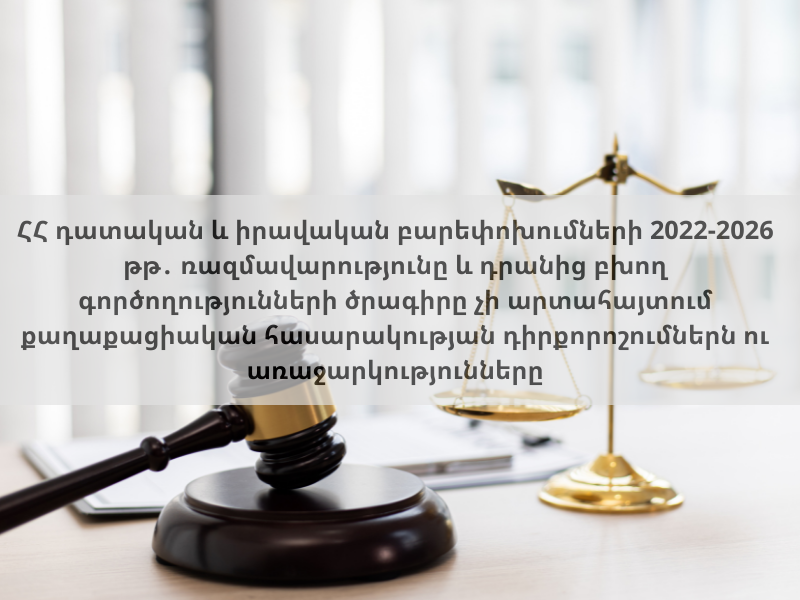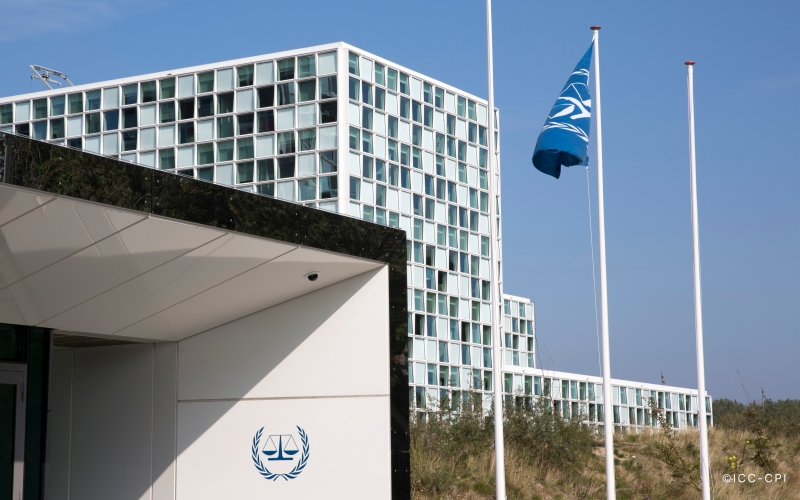




2022-2026 Strategy of the RA Judicial and Legal Reforms and its Action Plan do not reflect the position and recommendations of civil society

During the Government’s session of 21․07․2022, 2022-2026 Strategy of the RA Judicial and Legal Reforms and its Action Plan were adopted. The aforementioned Strategy and its Action Plan do not reflect the position and recommendations of civil society. The RA Ministry of Justice did not provide any answer or argument regarding accepting or rejecting the positions and recommendations of civil society organizations, which does not go in line with the principles of participation in the development and substantive public discussion of draft legal acts․
A number of civil society organizations have conducted comprehensive monitoring and published reports regarding the implementation of 2019-2023 Strategy of the RA Judicial and Legal Reforms and its Action Plan. The reports indicate a number of issues related to the implementation of the former Strategy, and also contain a number of recommendations of changes aimed at improving the Strategy. The aforementioned recommendations were electronically presented to the Ministry of Justice, and also provided during meetings of the working group created by the Order of the Ministry of Justice in order to ensure efficiency and public oversight of 2019-2023 Strategy of the RA Judicial and Legal Reforms and its Action Plan․ The organizations mentioned below presented recommendations regarding the new draft strategy also during the public discussion stage․
On the one hand, the new Strategy repeats the actions of the previous Strategy that were not implemented within the specified terms, and on the other hand, it enshrines new actions that are not useful and sufficient in terms of achieving the goal set by the Strategy. The main issues are as follows:
-
The issue of implementing vetting of judges should still be the core of judicial system reforms. This has been recommended to the RA Government along with a detailed road map and legislative proposals since 2018. Nonetheless, the new Strategy does not enshrine vetting of judges as a strategic action.
-
Backsliding was recorded in the safeguards of the fact-finding commission’s mandate, independence, accountability and representativeness. In particular, the Strategy envisages creation of a fact-finding commission in the frame of the RA Human Rights Defender Institute; while exclusion of the independent status of the fact-finding commission calls into doubt the impartiality and objectivity of the commission’s work.
-
Reforms envisaged for the prosecution system are fragmentary and insufficient as compared to the same direction of the previous Strategy; the only activity is regular assessment of integrity in the prosecution system, whereas 2019-2023 Strategy of the RA Judicial and Legal Reforms envisaged institutional reforms in the prosecution system, including changes in the rules for the formation of qualification commission and formation of ethics commission, reduction of the Prosecutor General’s role in the formation of the ethics commission, change in the hierarchy of the involvement of prosecutors in the autonomous representative bodies of the Prosecutor’s Office, etc. We have also recommended forming a collegial decision-making body for the Prosecutor’s office, i.e.,a Board, as a guarantee of increasing the independence and impartiality of the system (this is interconnected with constitutional reforms), which, however, has not been included in the new Strategy.
-
Important activities such as expanding the scope of challenging administrative bodies and their actions, ensuring safeguards of protecting the rights violated as a result of administrative procedures, as well as introducing effective mechanisms of appealing administrative acts to the higher body, have not been implemented and have been left out of the Strategy.
-
The Strategy has the status of a sublegislative act, which eliminates the possibility of the legislative body to establish indicators for assessing its implementation and efficiency, and the possibility of the National Assembly to approve them.
-
There is no report regarding implementation of the Action Plan of 2019-2023 Strategy; the obstacles and reasons for not implementing or partially implementing the activities of the Action Plan of 2019-2023 Strategy are unknown.
The issues and recommendations set forth by us are not limited to the ones mentioned above and include nearly all the goals and directions of the Strategy.
Taking the above-mentioned into account, we record that while the 2022-2026 Strategy of the RA Judicial and Legal Reforms and its Action Plan contain some measures favorable for the development of the justice system, they, nevertheless, do not reflect the solutions voiced by civil society for years on end. At the same time, the mentioned strategic documents have been developed with insufficient public participation, which does not go in line with the principles of effective cooperation with civil society.
Civilian oversight plays an important role for the development of a democratic state governed by the rule of law. Therefore, the process of developing, presenting and adopting strategic documents of public importance should be carried out with proper participation of wide circles of society. The activity of neither the Board coordinating the implementation of 2019-2023 Strategy of the RA Judicial and Legal Reforms and its Action Plan, nor the working group formed by the order of the Minister of Justice was compliant with principles of transparency, and accountability, the activities lacked effective structures of monitoring and assessment.
Taking the aforementioned into account, we recommend that the implementation of 2022-2026 Strategy and its Action Plan, and the activity of the monitoring board, and the working group of non-governmental organizations - formed to ensure improvement, monitoring and public oversight - be organized in line with the rules and principles of open dialogue, and society’s participation in the processes of developing policies and legislation.
Helsinki Citizen’s Assembly Vanadzor
Open Society Foundations-Armenia
Transparency International Anticorruption Center
Law Development and Protection Foundation
Protection of Rights without Borders NGO













